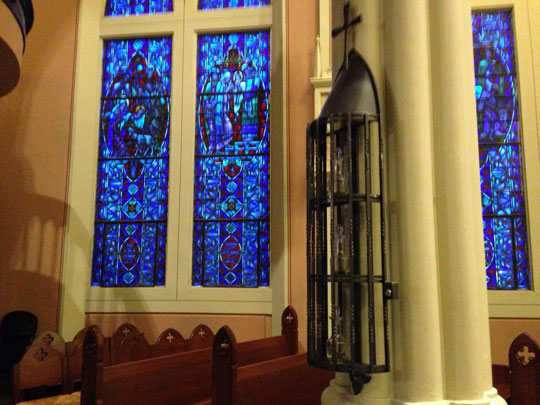
Last evening was one of the most delightful evenings I’ve ever had as a catechist! I decided that, since we would be doing a lot of storytelling, that it would be nice to do so sitting around a campfire!
I just needed to figure out how to build a pretend one indoors which luckily I found here. The kids absolutely loved it and it made for a very fun and engaging setting for getting a TON of work done! We dispensed with chairs and sat on the floor with bibles, binders, and pens. The kids pretended to warm their hands around the campfire!
First, I had kids tell the following stories using their notes from last week (Abraham Trusts in Gods Plan Worksheet), which they did very nicely (Worksheet Answer Key).
- Gn 12:1-8 (God’s call and migration)
- Gn 13:1-18 (God’s promise of land/a home)
- Gn 15:1-18 (God makes a covenant with Abram)
- Gn 17:1-9, 15-22 (God changes Abram’s and Sarai’s names)
- Gn 18:1-15 (3 visitors and the promise of a son)
- Gn 22: 1-18 (God tests Abraham’s faith)
After each story, we were able to discuss further some of the main points of the stories and the kids asked questions. Halfway through, we paused to “roast” marshmallows! The kids literally sat there with their marshmallows on sticks and “roasted” them over the fire as we chatted (see the pic)! We paused 2 more times throughout the session to roast marshmallows and it was fun. It actually also kept them on task because they would ask if they could roast another marshmallow and I said they would have to earn it by getting through a few more stories!
We then explored the stories of Jacob using this worksheet (Jacob worksheet) and their bibles to fill in the blanks (Jacob worksheet answer key). This turned out to be a very effective strategy for engaging them with the stories while also using their Bibles. The Jacob stories included:
- Gn 25:20-26 (Jacob and Esau)
- Gn 25:27-31 (Jacob “steals” Esau’s birthright)
- Gn 27:1-41 (Jacob deceives Isaac)
- Gn 28:12-14 (Jacob’s Ladder)
- Gn 29:10-27 (Jacob is tricked by Laban)
- Gn 32:25-35:22 (Jacob wrestles/has his name changed)
For our reflective prayer, the young people wrote prayers for the people in the Philippines recovering from the typhoon and came forward prayerfully one at a time to place their prayers along with donations into an offering box on the prayer table.
A word about the campfire. Was it necessary? No. However, I don’t consider that to be fluff. Learning takes place within a context and it is helpful when that context is conducive to the learning taking place. I have no doubt that this session was as effective as it was because of the pretend campfire since it engaged the young people, stimulated their imaginations, but did not distract them from the task at hand.




Be the first to comment